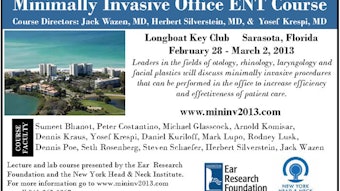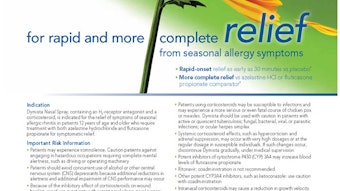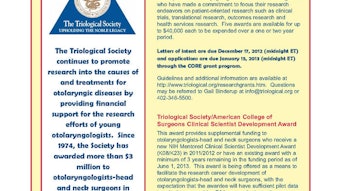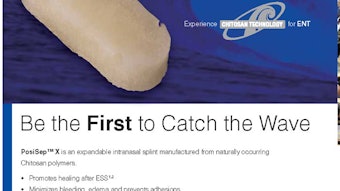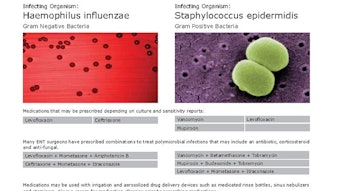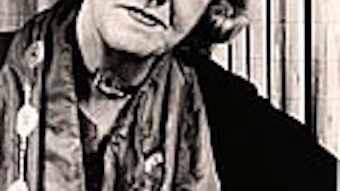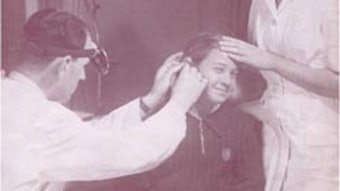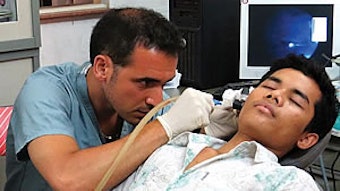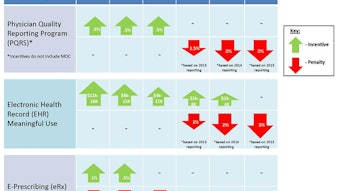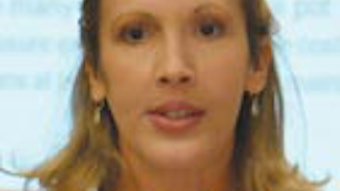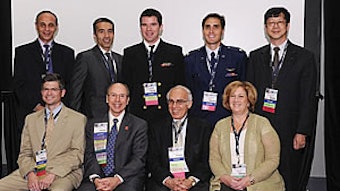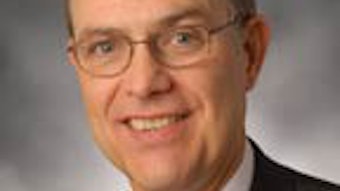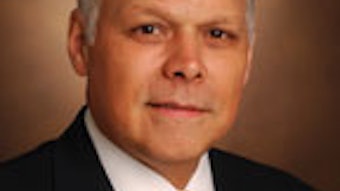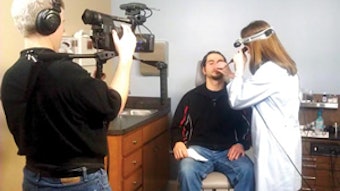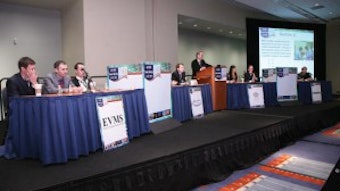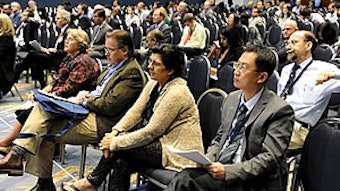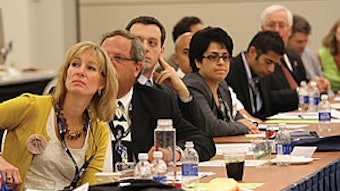The Board of Governors and You: Sign Up and Speak Up for Your Region
Wendy R. Stern, MD BOG Secretary The Board of Governors (BOG) is the grassroots arm of the Academy. It serves as a conduit for all of us and our Academy through state/local representation. The BOG meets twice a year. Every otolaryngology society in the country elects a governor and two representatives who serve on the BOG. The governor of each society is a voting member on the BOG. During the biannual meetings, the governors and representatives are invited to participate in the BOG Legislative Committee and the BOG Socioeconomic and Grassroots Committee meetings as members or guests. Issues include pending bills, current legislation, scope of practice, carrier relations, and access to care, among others. The BOG Legislative Committee conducts an annual conference call with society representatives, governors, and committee members to help monitor legislative activity around the country. This information aids our Academy’s Government Affairs division to maintain its vigilance and advocacy. This committee keeps our membership informed and invites activism through emailed action alerts. The BOG Socioeconomic and Grassroots Committee is forming a network of regional representation so issues affecting the practice of medicine nationwide will have direct and timely access to the committee. These forums are venues for the critical exchange of information. They present an invaluable opportunity for the BOG to learn about pressing issues facing Academy members, and conversely, for the governors and representatives to relay information to their society members of events happening in other locations that might affect their practice. The spring meeting takes place in the Washington area near the Academy headquarters. This meeting is open to anyone who wants to be more involved with the BOG. There are often workshops, leadership training sessions, and an ENT PAC (political action committee) event. This past spring, attendees participated in workshops on media, entrepreneurship, and the nuts and bolts of meaningful use. This meeting is also an excellent opportunity to network and meet colleagues from around the country. Following the meeting, the BOG promotes advocacy through participation in the OTO Advocacy Summit, which offers political guest speakers, advocacy workshops, and meetings with Members of Congress. The fall meeting, which dovetails with the AAO-HNSF Annual Meeting & OTO EXPO, is more focused on the committees’ agendas. The BOG General Assembly meeting occurs during the annual meeting. Governors are formally given reports by the BOG leadership and committee chairs as well as the opportunity to vote on referendums that will be presented to the Academy’s Board of Directors. The BOG also sponsors a miniseminar that takes place during the annual meeting. This past meeting the BOG Executive Committee was proud to present, “Hot Topics in Otolaryngology: 2012.” This was a successful seminar that delved into the changing relationship between the physician and the hospital. Pressures to produce a more integrated relationship are increasing partially due to healthcare reform laws and in response to Medicare, Medicaid, and Congressionally-directed efforts to reduce healthcare costs and the deficit. Darlene Burgess, vice president of corporate government affairs for the Henry Ford Health System spoke to us about her experience with one of the nation’s leading and largest integrated healthcare systems. Raymund C. King, MD, JD, an otolaryngologist and now healthcare and corporate attorney, described laws such as Stark, anti-kickback compliance, and the Patient Affordable Care Act in an easily understood fashion. He then described how they lead to the changes we are seeing, specifically citing the formation of Accountable Care Organizations. Joy Trimmer, JD, senior director of Government Affairs for the Academy, updated us on the Academy’s advocacy efforts and described the potential political scenarios that may arise from the presidential election and how they might affect many of the reforms that are currently underway. The BOG is committed to producing a miniseminar salient to our members and their ability to practice medicine. We are paying attention to the changing healthcare environment and are looking forward to producing another meaningful miniseminar next year in Vancouver. As the practice of medicine changes, the BOG must hear your grassroots voice. I urge each of you to be an active member of your state/local or special interest otolaryngology society and make sure your society participates in the BOG. If your society is not an active BOG member, step forward and volunteer to make sure that your society’s voice is represented. We need to know what is happening in your offices, your hospitals, your community, and in your state legislative bodies. It is the best way to be proactive and effective. The Academy cannot connect with your BOG representatives unless staff has accurate and up-to-date records of your society officers. To view your individual BOG society’s information, visit: http://www.entnet.org/Community/BOGSocieties.cfm?View=State. Email bog@entnet.org to update your society information or ask any BOG-related questions. See you at our next BOG Spring Meeting, May 5-6, and OTO Advocacy Summit, May 6-7, 2013 (www.entnet.org/bog&summit).
Wendy R. Stern, MD
BOG Secretary
The Board of Governors (BOG) is the grassroots arm of the Academy. It serves as a conduit for all of us and our Academy through state/local representation. The BOG meets twice a year. Every otolaryngology society in the country elects a governor and two representatives who serve on the BOG. The governor of each society is a voting member on the BOG. During the biannual meetings, the governors and representatives are invited to participate in the BOG Legislative Committee and the BOG Socioeconomic and Grassroots Committee meetings as members or guests. Issues include pending bills, current legislation, scope of practice, carrier relations, and access to care, among others.
The BOG Legislative Committee conducts an annual conference call with society representatives, governors, and committee members to help monitor legislative activity around the country. This information aids our Academy’s Government Affairs division to maintain its vigilance and advocacy. This committee keeps our membership informed and invites activism through emailed action alerts. The BOG Socioeconomic and Grassroots Committee is forming a network of regional representation so issues affecting the practice of medicine nationwide will have direct and timely access to the committee. These forums are venues for the critical exchange of information. They present an invaluable opportunity for the BOG to learn about pressing issues facing Academy members, and conversely, for the governors and representatives to relay information to their society members of events happening in other locations that might affect their practice.
The spring meeting takes place in the Washington area near the Academy headquarters. This meeting is open to anyone who wants to be more involved with the BOG. There are often workshops, leadership training sessions, and an ENT PAC (political action committee) event. This past spring, attendees participated in workshops on media, entrepreneurship, and the nuts and bolts of meaningful use. This meeting is also an excellent opportunity to network and meet colleagues from around the country. Following the meeting, the BOG promotes advocacy through participation in the OTO Advocacy Summit, which offers political guest speakers, advocacy workshops, and meetings with Members of Congress.
The fall meeting, which dovetails with the AAO-HNSF Annual Meeting & OTO EXPO, is more focused on the committees’ agendas. The BOG General Assembly meeting occurs during the annual meeting. Governors are formally given reports by the BOG leadership and committee chairs as well as the opportunity to vote on referendums that will be presented to the Academy’s Board of Directors. The BOG also sponsors a miniseminar that takes place during the annual meeting.
This past meeting the BOG Executive Committee was proud to present, “Hot Topics in Otolaryngology: 2012.” This was a successful seminar that delved into the changing relationship between the physician and the hospital. Pressures to produce a more integrated relationship are increasing partially due to healthcare reform laws and in response to Medicare, Medicaid, and Congressionally-directed efforts to reduce healthcare costs and the deficit. Darlene Burgess, vice president of corporate government affairs for the Henry Ford Health System spoke to us about her experience with one of the nation’s leading and largest integrated healthcare systems. Raymund C. King, MD, JD, an otolaryngologist and now healthcare and corporate attorney, described laws such as Stark, anti-kickback compliance, and the Patient Affordable Care Act in an easily understood fashion. He then described how they lead to the changes we are seeing, specifically citing the formation of Accountable Care Organizations.
Joy Trimmer, JD, senior director of Government Affairs for the Academy, updated us on the Academy’s advocacy efforts and described the potential political scenarios that may arise from the presidential election and how they might affect many of the reforms that are currently underway. The BOG is committed to producing a miniseminar salient to our members and their ability to practice medicine. We are paying attention to the changing healthcare environment and are looking forward to producing another meaningful miniseminar next year in Vancouver.
As the practice of medicine changes, the BOG must hear your grassroots voice. I urge each of you to be an active member of your state/local or special interest otolaryngology society and make sure your society participates in the BOG. If your society is not an active BOG member, step forward and volunteer to make sure that your society’s voice is represented.
We need to know what is happening in your offices, your hospitals, your community, and in your state legislative bodies. It is the best way to be proactive and effective. The Academy cannot connect with your BOG representatives unless staff has accurate and up-to-date records of your society officers. To view your individual BOG society’s information, visit: http://www.entnet.org/Community/BOGSocieties.cfm?View=State. Email bog@entnet.org to update your society information or ask any BOG-related questions.
See you at our next BOG Spring Meeting, May 5-6, and OTO Advocacy Summit, May 6-7, 2013 (www.entnet.org/bog&summit).
